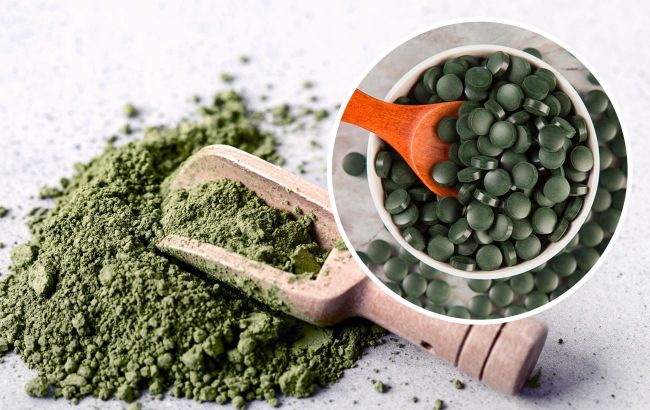What is spirulina and is it really good for health
 What is spirulina and is it really good for health (collage by RBC-Ukraine)
What is spirulina and is it really good for health (collage by RBC-Ukraine)
Spirulina contains a high content of beneficial nutrients and has a powerful effect on the body and health. The blue-green algae has both many health benefits and drawbacks that everyone should be aware of.
What is spirulina
Spirulina is an alga that has been used in various cultures for centuries. The algae got its name due to its unusual shape: if you look at the microorganism under a microscope, you will see a small green spiral.
Today, it is widely used in medicine, as a dietary supplement, and as a coloring agent in chewing gum, candy, and other food products.
Spirulina is an important product for human nutrition and can be used as a complete source of proteins, vitamins, and minerals without any significant side effects.
100 g of dry spirulina powder contains 290 calories. The protein level in spirulina reaches up to 70% of dry weight, which is comparable to eggs.
Benefits of spirulina
Provides vitamins and minerals
Nutritionist Amy Satrazemis said that spirulina contains a significant amount of calcium, niacin, potassium, magnesium, B vitamins, and iron.
Spirulina is especially high in vitamin B12, which helps build DNA and is key to maintaining healthy blood and nerve cells.
It is also a good source of iron, containing approximately 2 g per 1 tablespoon.
Antioxidant
Spirulina is a great source of antioxidants. It stimulates the brain, acts as an analgesic and anti-inflammatory agent, blocks free radicals, and protects cells from oxidative damage.
Most of the functions are performed by the plant protein phycocyanin, which fights any chronic inflammation
Lowers blood pressure
Too high blood pressure puts additional stress on the blood vessels, heart, brain, kidneys, and eyes. This increases the risk of heart attacks, aortic aneurysm, vascular dementia, and kidney disease.
Thanks to chlorophyll, which optimizes the pH level in the body, spirulina supplementation makes blood vessels softer and wider: blood flow improves, blood pressure normalizes.
Supports the immune system
Spirulina can stimulate the production of antibodies and increase or decrease the expression of genes encoding cytokines to induce immunomodulatory and anti-inflammatory reactions.
Promotes weight loss
Spirulina contributes to a healthy diet and improves the effect of weight loss diets. The algae is low in fat and calories, but it contains an amino acid that suppresses appetite.
When spirulina is harmful
Spirulina can cause individual intolerance and allergies. The blue-green algae boosts the immune system and is contraindicated in people with diseases associated with immune system overactivity.
Spirulina can reduce the effectiveness of immunosuppressants used in the treatment of certain diseases.
It is not recommended to use microalgae together with drugs that reduce blood clotting.
The standard daily dose varies between 1 g and 3 g, but it can be increased up to 10 g, following the manufacturer's recommendations. The portion should be divided into 2-3 doses and, importantly, introduced into the diet not abruptly, but gradually.
This material is for informational purposes only and should not be used for medical diagnosis or self-treatment. Our goal is to provide readers with accurate information about symptoms, causes, and methods of detecting diseases. RBС-Ukraine is not responsible for any diagnoses that readers may make based on materials from the resource. We do not recommend self-treatment and advise consulting a doctor in case of any health concerns.

